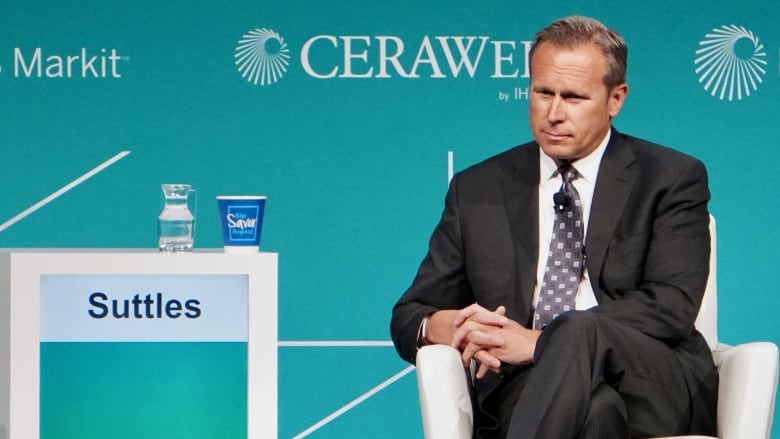Encana declaring itself American is a gut punch for Alberta
Move won't impact jobs or spending, but it's distressing for the already beaten-down oilpatch

The most historic energy company in Canada decided on Thursday to fill out some forms and declare itself American.
That change is an exceptionally bitter pill to swallow for the beleaguered oilpatch in Western Canada.
Back in 1958, the Canadian Pacific Railway created the Canadian Pacific Oil and Gas Company to begin an assertive search for oil and gas on the railway's mineral rights (which were granted by Sir John A. Macdonald).
Following a series of mergers and acquisitions over the decades, Encana was formed in 2002 and, at one point, was the largest energy company in the country.
That's just one reason, though, why Encana's decision to proclaim itself an American company packs such a bite.
It stings for Calgary. The city is desperate for companies to relocate their headquarters to the city, not the opposite. Calgary's downtown office vacancy rate has remained about 20 per cent for several years and the city created a $100 million fund to attract head offices and fill those downtown towers. Calgary mayor Naheed Nenshi called the Encana news a "sad" development.
Sad to hear the news about Encana. <br><br>This is a loss for Calgary and for Alberta. The silver lining is that, for now at least, this isn’t a loss of jobs for our city, and that’s my biggest focus.
—@nenshiIt stings for Alberta. The provincial government is desperate for job growth, for the attention of investors, and for Alberta to regain its prominence as the Houston of Canada. Corporate tax cuts and other initiatives aren't stemming the tide of declining investment and drilling activity, at least not yet. When the premier celebrates the opening of a McDonald's restaurant, you can argue it shows a dire need for any type of economic growth. A business grand opening of that size is usually reserved for city councillors, not a premier.
Celebrated the opening of a new <a href="https://twitter.com/McDonalds?ref_src=twsrc%5Etfw">@McDonalds</a> franchise in Sherwood Park tonight, which is creating 60 new jobs, mainly first time jobs for teenagers. <br><br>The owners decided to open this franchise after the provincial election, & said the Youth Job Creation Wage was a big factor. <a href="https://t.co/kBc2nogiAS">pic.twitter.com/kBc2nogiAS</a>
—@jkenneyIt stings for the oilpatch. The industry is desperate for any signs of positivity. By just about every metric, the sector is struggling. Make no mistake, this was a gut punch.
Alberta is in "full on crisis mode," said Martin Pelletier, a portfolio manager with TriVest Wealth Counsel.
Already many drilling and other companies have moved equipment and crews for brighter pastures in Texas and other southern states. Following Encana's announcement, Pelletier expects other companies to follow suit.
Encana maintains its change of address won't impact jobs in Alberta nor will it change its spending plans north of the border. The company said the reason was clear, it needed to improve its profile with investors and attract more investment.
While the rationale is important, it only does so much to numb the pain.
The Encana decision was still being digested when industry groups gathered in downtown Calgary on Thursday morning to present their forecasts for the sector's performance in 2020. They were dismal.
The sector has struggled ever since the oil price crash five years ago. Total investment in oilsands, conventional oil and natural gas production next year "will be flat, at best," said Ben Brunnen, with the Canadian Association of Petroleum Producers.
Oil and gas prices remain depressed in Western Canada. Natural gas has struggled the most. A decade ago, it wasn't unusual for prices to climb above $10 per MMBtu (million British thermal units). For much of the past few years though, prices in Alberta have been less than $2 and only climbed slightly higher in the last month.
"I nearly fell off my chair this morning when I saw [prices] over three dollars," said Ian Gillies, with GMP FirstEnergy.
Encana's shift south of the border makes financial sense, he said.
"We all realize where we are. There is more investment happening in the U.S. and if that's where the opportunities lie, that's where companies are going to go," said Gillies.
This will surely spark western alienation concerns.
Critics, especially those in downtown Calgary, will point the finger at the federal government for creating what they say is a poor investment climate in the energy sector, with too many regulations and not enough new export pipelines.
The federal government was disappointed by the Encana decision, according to a spokesperson, who added Ottawa will take "the necessary steps to ensure Canada and Alberta remain competitive, and that our energy sector remains a source of good, middle class jobs."
Federal govt's response to Encana's decision: "...we are disappointed to hear this news..." FULL STATEMENT here: <a href="https://t.co/2b6Ip8jTHw">https://t.co/2b6Ip8jTHw</a>
—@VassyKapelosEven if a slew of new pipes are built, the oilpatch's woes run deep. It's not a place many investors want to park their money, nor where companies want to spend.
New pipelines would be "a good start," said Melissa Greig, an analyst with IHS Markit. "But we also have a lot of companies leaving the country. We need capital too to continue the growth of the oil and gas industry."
Encana's move was somewhat expected. Since Doug Suttles took the reins of the company in 2013, he's largely converted Encana from a Canadian natural gas firm to an American oil company.
The Texas-bred executive has sold several Canadian assets and acquired properties south of the border, highlighted by the $7.7 billion US purchase of Houston-based Newfield Exploration Co. last year. That's also when Suttles said the company would follow a "headquarter-less model" with offices in Calgary, Denver and Houston.
Declaring itself American wasn't a surprise. Still, that hardly cushions the blow, especially for a city, province and industry already down on their knees.